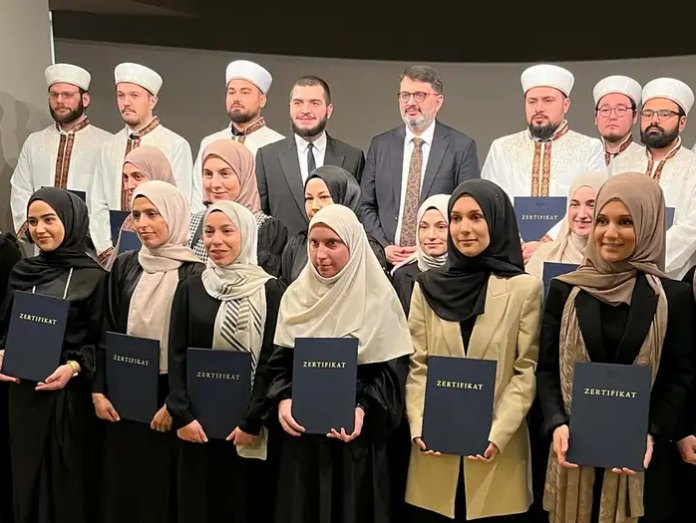Germany launched training for its own Muslim religious leaders, with Muslim groups across the country witnessing the changes brought by the new generation, according to Deutsche Welle.
Osman Soyer is one of 28 young people trained as “religious representatives” by DITIB, the largest Islamic organisation in Germany. Soyer was sworn into office this month at the Sehitlik Mosque in Berlin’s Neukölln neighbourhood.
Soyer has been working as an Islamic religion representative in Alfter, in western Germany, for several months now. His outreach work includes a wide range of activities.
I teach pupils, I’m a prayer leader, preacher and pastor. We also go to weddings, I do funerals.
Approximately 900 mosque communities form the Turkish-Islamic Union, part of the Institute of Religion (DITIB) in Germany. This is out of more than 3,000 alleged mosques and Muslim houses of worship in Germany in total.
The training programme is an “important service”, Eyüp Kalyon, DITIB Secretary General, said, adding that his association is focused on the needs of Muslims in Germany.
As a religious community, it seeks to provide both personal and financial support and has achieved a change in perspective, reflected in the training of German imams to foster “social cohesion,” Kalyon stated, noting that in the future, German “will be a much bigger part of the picture.”
“It will be the language that binds us all together, that connects the Muslim community in particular. That’s why our training language is German.”
The idea of training Muslim clergy in Germany has long been part of discussions on integration and religious policy in Germany. The German Islamic Conference (DIK), established in 2006, has always emphasised the problem of imams’ insufficient proficiency in German.
In 2020, DITIB turned a former youth hostel in Dahlem, in the remote Eifel region of western Germany, into a training centre. A year later, Islamic scholars from the University of Osnabrück and German Muslims with Bosnian roots established the Islam College of Germany (IKD).
Horst Seehofer, then Interior Minister, praised the IKD as good news for Muslims in Germany and a recognition of “the reality of life for Muslims living in Germany.” Both DITIB and the Islamic College in Osnabrück have already employed several dozen graduates, with imams from both institutions leading prayers and conducting Friday prayer services.
However, Federal Interior Minister Nancy Faeser announced that after lengthy negotiations with Diyanet and DITIB, her ministry agreed to phase out the deployment of state-sponsored religious representatives from Turkey.
This is an important milestone for the integration and participation of Muslim communities in Germany.
Germany is following France’s example: since the beginning of this year, the latter has no longer allowed new imams from abroad into the country, requiring clerics to study at French universities. This religious amendment initiated by President Emmanuel Macron in early 2020 has now come into force. Until now, French imams were mainly from Morocco, Tunisia and Algeria.
After years of debate and delays, the training of Muslim religious leaders in Germany is evolving. However, many questions – above all the funding of DITIB imams without Turkish support – remain open.
